2020年高考英语新题型写作技巧八 强调倒装虚拟语气句型和丰富细节的手段
- 格式:docx
- 大小:42.85 KB
- 文档页数:12
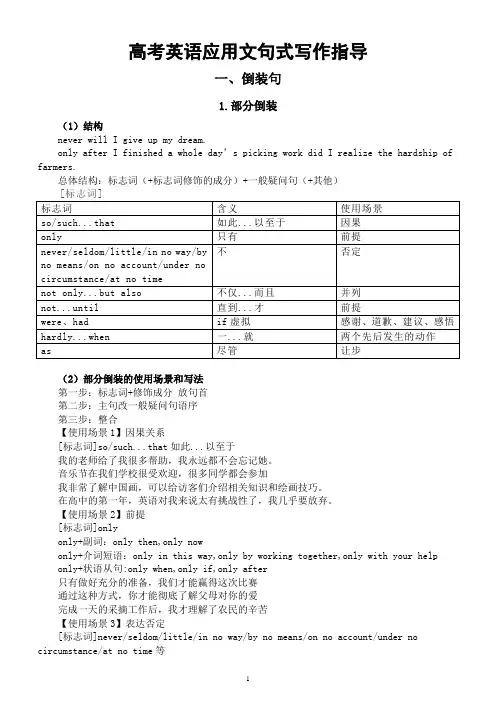
高考英语应用文句式写作指导一、倒装句1.部分倒装(1)结构never will I give up my dream.only after I finished a whole day’s picking work did I realize the hardship of farmers.总体结构:标志词(+标志词修饰的成分)+一般疑问句(+其他)(2)部分倒装的使用场景和写法第一步:标志词+修饰成分放句首第二步:主句改一般疑问句语序第三步:整合【使用场景1】因果关系[标志词]so/such...that如此...以至于我的老师给了我很多帮助,我永远都不会忘记她。
音乐节在我们学校很受欢迎,很多同学都会参加我非常了解中国画,可以给访客们介绍相关知识和绘画技巧。
在高中的第一年,英语对我来说太有挑战性了,我几乎要放弃。
【使用场景2】前提[标志词]onlyonly+副词:only then,only nowonly+介词短语:only in this way,only by working together,only with your help only+状语从句:only when,only if,only after只有做好充分的准备,我们才能赢得这次比赛通过这种方式,你才能彻底了解父母对你的爱完成一天的采摘工作后,我才理解了农民的辛苦【使用场景3】表达否定[标志词]never/seldom/little/in no way/by no means/on no account/under no circumstance/at no time等去中国朋友家里做客绝不应该迟到我们永远不会忘记你给我们的慷慨帮助你的妈妈永远不会伤害你【使用场景4】并列关系[标志词]not only...but also她不仅教给我们有用的知识,还给予我们及时的精神鼓励这些活动中,我们不仅能收获友谊,还能缓解身心压力在体育运动中,我们不仅可以提升身体素质,还可以培养团队精神在常规训练中,我们不仅要锻炼个人能力,还要增强团队合作我不仅可以帮忙组织活动,还可以现场展示中国画绘画技巧【使用场景5】前提[标志词]not...until...直到...才...直到我跑完全程,我才理解了坚持的重要性直到你离开学校,你才能真正感觉到学校生活的价值直到完成了所有的工作,我才理解了父母的辛苦【使用场景6】表达感谢/道歉/建议/感悟等[标志词]were/had(if虚拟条件句)如果我是你,我会和她面对面坦诚沟通一次如果不是因为你耐心的指导,我无法克服困难,树立信心。
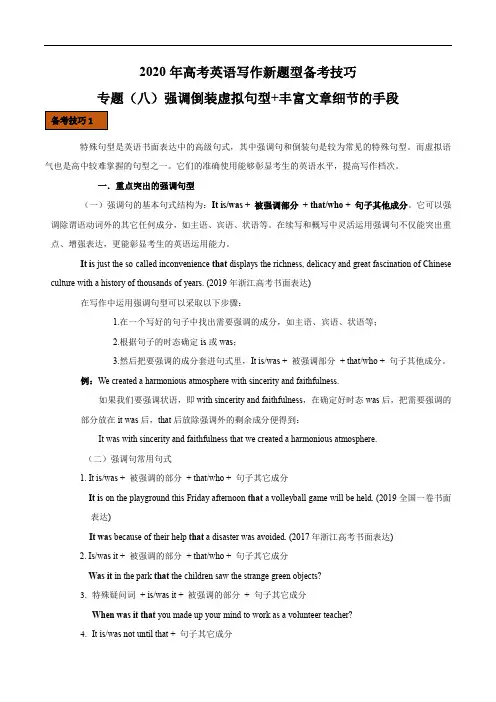
2020年高考英语写作新题型备考技巧专题(八)强调倒装虚拟句型+丰富文章细节的手段特殊句型是英语书面表达中的高级句式,其中强调句和倒装句是较为常见的特殊句型。
而虚拟语气也是高中较难掌握的句型之一。
它们的准确使用能够彰显考生的英语水平,提高写作档次。
一.重点突出的强调句型(一)强调句的基本句式结构为:It is/was + 被强调部分+ that/who + 句子其他成分。
它可以强调除谓语动词外的其它任何成分,如主语、宾语、状语等。
在续写和概写中灵活运用强调句不仅能突出重点、增强表达,更能彰显考生的英语运用能力。
It is just the so-called inconvenience that displays the richness, delicacy and great fascination of Chinese culture with a history of thousands of years. (2019年浙江高考书面表达)在写作中运用强调句型可以采取以下步骤:1.在一个写好的句子中找出需要强调的成分,如主语、宾语、状语等;2.根据句子的时态确定is或was;3.然后把要强调的成分套进句式里,It is/was + 被强调部分+ that/who + 句子其他成分。
例:We created a harmonious atmosphere with sincerity and faithfulness.如果我们要强调状语,即with sincerity and faithfulness,在确定好时态was后,把需要强调的部分放在it was后,that后放除强调外的剩余成分便得到:It was with sincerity and faithfulness that we created a harmonious atmosphere.(二)强调句常用句式1. It is/was + 被强调的部分+ that/who + 句子其它成分It is on the playground this Friday afternoon that a volleyball game will be held. (2019全国一卷书面表达)It was because of their help that a disaster was avoided. (2017年浙江高考书面表达)2. Is/was it + 被强调的部分+ that/who + 句子其它成分Was it in the park that the children saw the strange green objects?3.特殊疑问词+ is/was it + 被强调的部分+ 句子其它成分When was it that you made up your mind to work as a volunteer teacher?4.It is/was not until that + 句子其它成分It wasn’t until he went through real hardship that he realized the love for a family counts.5.注意:强调谓语动词时,可以用助动词do/does/didWe did hope there would be more meaningful activities in the coming future. (2015年北京高考)二.平衡句子的倒装句型英语书面表达中的倒装举行主要包括部分倒装和全倒装。
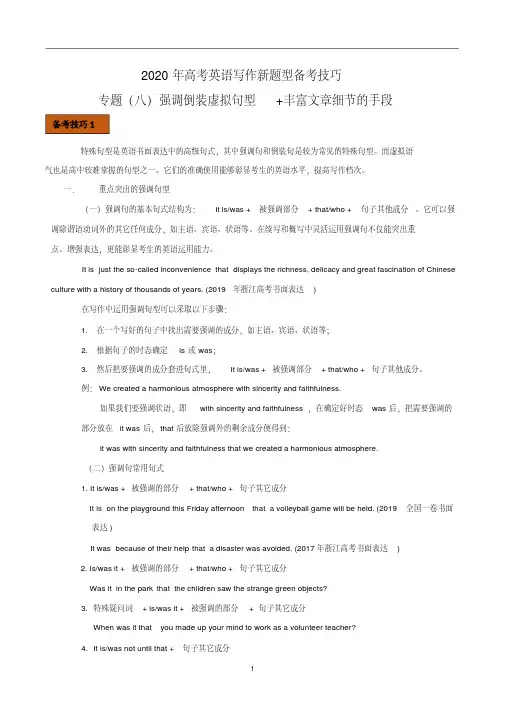
2020年高考英语写作新题型备考技巧专题(八)强调倒装虚拟句型+丰富文章细节的手段特殊句型是英语书面表达中的高级句式,其中强调句和倒装句是较为常见的特殊句型。
而虚拟语气也是高中较难掌握的句型之一。
它们的准确使用能够彰显考生的英语水平,提高写作档次。
一.重点突出的强调句型(一)强调句的基本句式结构为:It is/was + 被强调部分+ that/who + 句子其他成分。
它可以强调除谓语动词外的其它任何成分,如主语、宾语、状语等。
在续写和概写中灵活运用强调句不仅能突出重点、增强表达,更能彰显考生的英语运用能力。
It is just the so-called inconvenience that displays the richness, delicacy and great fascination of Chinese culture with a history of thousands of years. (2019年浙江高考书面表达)在写作中运用强调句型可以采取以下步骤:1.在一个写好的句子中找出需要强调的成分,如主语、宾语、状语等;2.根据句子的时态确定is或was;3.然后把要强调的成分套进句式里,It is/was + 被强调部分+ that/who + 句子其他成分。
例:We created a harmonious atmosphere with sincerity and faithfulness.如果我们要强调状语,即with sincerity and faithfulness,在确定好时态was后,把需要强调的部分放在it was后,that后放除强调外的剩余成分便得到:It was with sincerity and faithfulness that we created a harmonious atmosphere.(二)强调句常用句式1. It is/was + 被强调的部分+ that/who + 句子其它成分It is on the playground this Friday afternoon that a volleyball game will be held. (2019全国一卷书面表达)It was because of their help that a disaster was avoided. (2017年浙江高考书面表达)2. Is/was it + 被强调的部分+ that/who + 句子其它成分Was it in the park that the children saw the strange green objects?3.特殊疑问词+ is/was it + 被强调的部分+ 句子其它成分When was it that you made up your mind to work as a volunteer teacher?4.It is/was not until that + 句子其它成分It wasn’t until he went through real hardship that he realized the love for a family counts.5.注意:强调谓语动词时,可以用助动词do/does/didWe did hope there would be more meaningful activities in the coming future. (2015年北京高考)二.平衡句子的倒装句型英语书面表达中的倒装举行主要包括部分倒装和全倒装。
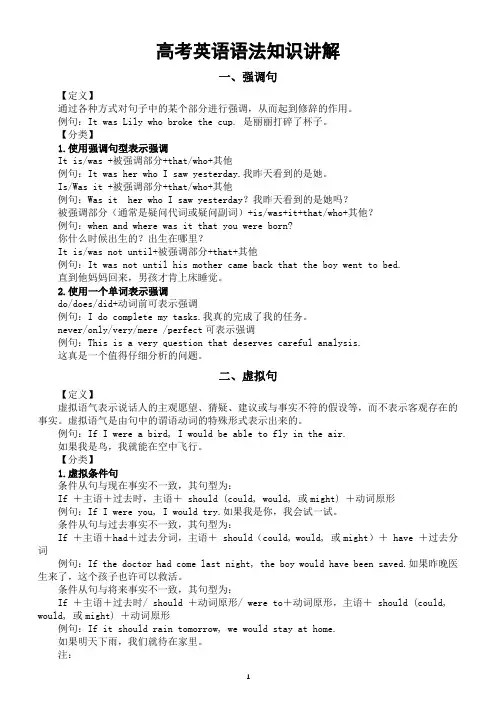
高考英语语法知识讲解一、强调句【定义】通过各种方式对句子中的某个部分进行强调,从而起到修辞的作用。
例句:It was Lily who broke the cup. 是丽丽打碎了杯子。
【分类】1.使用强调句型表示强调It is/was +被强调部分+that/who+其他例句:It was her who I saw yesterday.我昨天看到的是她。
Is/Was it +被强调部分+that/who+其他例句:Was it her who I saw yesterday?我昨天看到的是她吗?被强调部分(通常是疑问代词或疑问副词)+is/was+it+that/who+其他?例句:when and where was it that you were born?你什么时候出生的?出生在哪里?It is/was not until+被强调部分+that+其他例句:It was not until his mother came back that the boy went to bed.直到他妈妈回来,男孩才肯上床睡觉。
2.使用一个单词表示强调do/does/did+动词前可表示强调例句:I do complete my tasks.我真的完成了我的任务。
never/only/very/mere /perfect可表示强调例句:This is a very question that deserves careful analysis.这真是一个值得仔细分析的问题。
二、虚拟句【定义】虚拟语气表示说话人的主观愿望、猜疑、建议或与事实不符的假设等,而不表示客观存在的事实。
虚拟语气是由句中的谓语动词的特殊形式表示出来的。
例句:If I were a bird, I would be able to fly in the air.如果我是鸟,我就能在空中飞行。
【分类】1.虚拟条件句条件从句与现在事实不一致,其句型为:If +主语+过去时,主语+ should (could, would, 或might) +动词原形例句:If I were you, I would try.如果我是你,我会试一试。
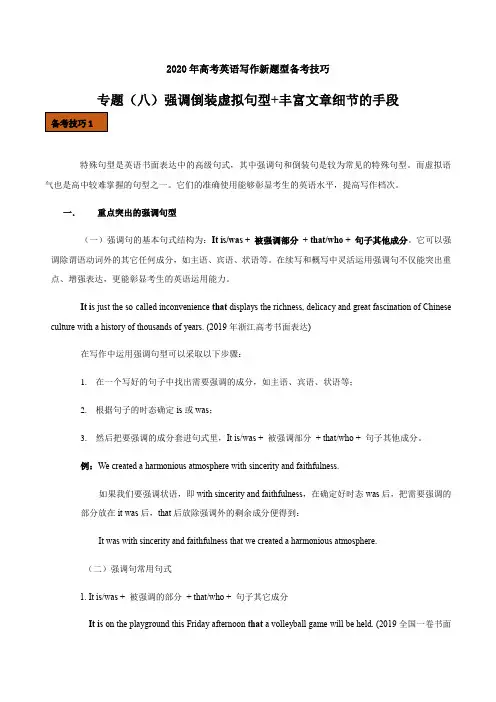
2020年高考英语写作新题型备考技巧专题(八)强调倒装虚拟句型+丰富文章细节的手段特殊句型是英语书面表达中的高级句式,其中强调句和倒装句是较为常见的特殊句型。
而虚拟语气也是高中较难掌握的句型之一。
它们的准确使用能够彰显考生的英语水平,提高写作档次。
一.重点突出的强调句型(一)强调句的基本句式结构为:It is/was + 被强调部分+ that/who + 句子其他成分。
它可以强调除谓语动词外的其它任何成分,如主语、宾语、状语等。
在续写和概写中灵活运用强调句不仅能突出重点、增强表达,更能彰显考生的英语运用能力。
It is just the so-called inconvenience that displays the richness, delicacy and great fascination of Chinese culture with a history of thousands of years. (2019年浙江高考书面表达)在写作中运用强调句型可以采取以下步骤:1.在一个写好的句子中找出需要强调的成分,如主语、宾语、状语等;2.根据句子的时态确定is或was;3.然后把要强调的成分套进句式里,It is/was + 被强调部分+ that/who + 句子其他成分。
例:We created a harmonious atmosphere with sincerity and faithfulness.如果我们要强调状语,即with sincerity and faithfulness,在确定好时态was后,把需要强调的部分放在it was后,that后放除强调外的剩余成分便得到:It was with sincerity and faithfulness that we created a harmonious atmosphere.(二)强调句常用句式1. It is/was + 被强调的部分+ that/who + 句子其它成分It is on the playground this Friday afternoon that a volleyball game will be held. (2019全国一卷书面表达)It was because of their help that a disaster was avoided. (2017年浙江高考书面表达)2. Is/was it + 被强调的部分+ that/who + 句子其它成分Was it in the park that the children saw the strange green objects?3.特殊疑问词+ is/was it + 被强调的部分+ 句子其它成分When was it that you made up your mind to work as a volunteer teacher?4.It is/was not until that + 句子其它成分It wasn’t until he went through real hardship that he realized the love for a family counts.5.注意:强调谓语动词时,可以用助动词do/does/didWe did hope there would be more meaningful activities in the coming future. (2015年北京高考)二.平衡句子的倒装句型英语书面表达中的倒装举行主要包括部分倒装和全倒装。
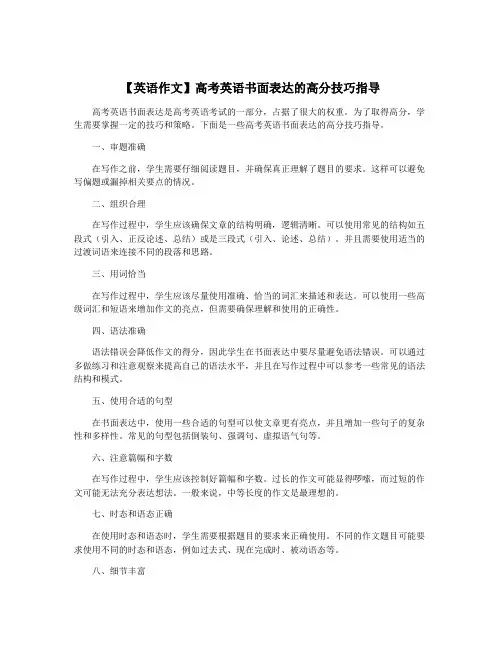
【英语作文】高考英语书面表达的高分技巧指导高考英语书面表达是高考英语考试的一部分,占据了很大的权重。
为了取得高分,学生需要掌握一定的技巧和策略。
下面是一些高考英语书面表达的高分技巧指导。
一、审题准确在写作之前,学生需要仔细阅读题目,并确保真正理解了题目的要求。
这样可以避免写偏题或漏掉相关要点的情况。
二、组织合理在写作过程中,学生应该确保文章的结构明确,逻辑清晰。
可以使用常见的结构如五段式(引入、正反论述、总结)或是三段式(引入、论述、总结)。
并且需要使用适当的过渡词语来连接不同的段落和思路。
三、用词恰当在写作过程中,学生应该尽量使用准确、恰当的词汇来描述和表达。
可以使用一些高级词汇和短语来增加作文的亮点,但需要确保理解和使用的正确性。
四、语法准确语法错误会降低作文的得分,因此学生在书面表达中要尽量避免语法错误。
可以通过多做练习和注意观察来提高自己的语法水平,并且在写作过程中可以参考一些常见的语法结构和模式。
五、使用合适的句型在书面表达中,使用一些合适的句型可以使文章更有亮点,并且增加一些句子的复杂性和多样性。
常见的句型包括倒装句、强调句、虚拟语气句等。
六、注意篇幅和字数在写作过程中,学生应该控制好篇幅和字数。
过长的作文可能显得啰嗦,而过短的作文可能无法充分表达想法。
一般来说,中等长度的作文是最理想的。
七、时态和语态正确在使用时态和语态时,学生需要根据题目的要求来正确使用。
不同的作文题目可能要求使用不同的时态和语态,例如过去式、现在完成时、被动语态等。
八、细节丰富写作的时候,学生应该尽量提供丰富的细节和具体的例子来支持自己的观点。
这样可以使作文更具说服力,并且增加文章的内容丰富度。
九、阅读优秀范文学生可以多阅读一些高分范文来学习和借鉴其中的语言表达和写作技巧。
可以注意范文的结构、用词、语法和句型,然后运用到自己的写作中。
高分的英语书面表达需要学生具备一定的语言能力和写作技巧。
希望上述的高分技巧指导对学生们取得优秀的成绩有所帮助。
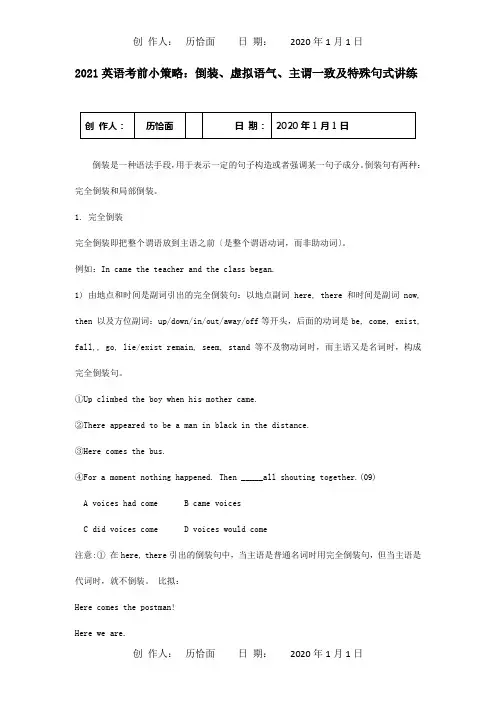
2021英语考前小策略:倒装、虚拟语气、主谓一致及特殊句式讲练倒装是一种语法手段,用于表示一定的句子构造或者强调某一句子成分。
倒装句有两种:完全倒装和局部倒装。
1. 完全倒装完全倒装即把整个谓语放到主语之前〔是整个谓语动词,而非助动词〕。
例如:In came the teacher and the class began.1) 由地点和时间是副词引出的完全倒装句:以地点副词here, there和时间是副词now, then 以及方位副词:up/down/in/out/away/off等开头,后面的动词是be, come, exist, fall,, go, lie/exist remain, seem, stand等不及物动词时,而主语又是名词时,构成完全倒装句。
①Up climbed the boy when his mother came.②There appeared to be a man in black in the distance.③Here comes the bus.④For a moment nothing happened. Then _____all shouting together.(09)A voices had comeB came voicesC did voices comeD voices would come注意:①在here, there引出的倒装句中,当主语是普通名词时用完全倒装句,但当主语是代词时,就不倒装。
比拟:Here comes the postman!Here we are.②当强调表语时,可以使用完全倒装句,起强调作用。
①Lucky is he who has been enrolled into a famous university.②Typical for China is the crosstalk show where a pair of comedians entertains the audience with word play.3)such +be+主语的情况用以强调表语。
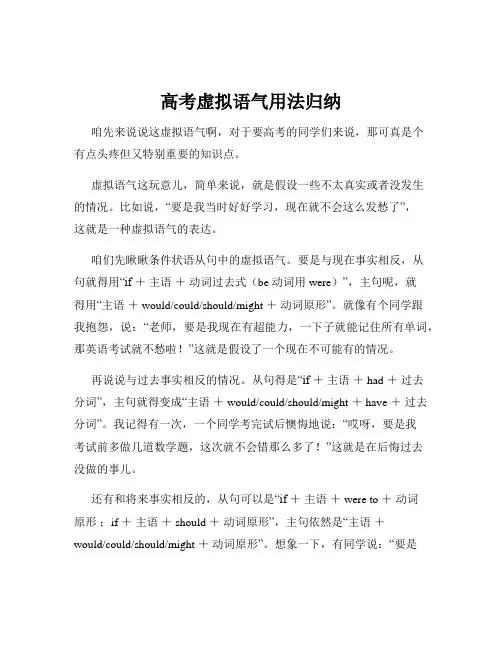
高考虚拟语气用法归纳咱先来说说这虚拟语气啊,对于要高考的同学们来说,那可真是个有点头疼但又特别重要的知识点。
虚拟语气这玩意儿,简单来说,就是假设一些不太真实或者没发生的情况。
比如说,“要是我当时好好学习,现在就不会这么发愁了”,这就是一种虚拟语气的表达。
咱们先瞅瞅条件状语从句中的虚拟语气。
要是与现在事实相反,从句就得用“if +主语+动词过去式(be 动词用 were)”,主句呢,就得用“主语+ would/could/should/might +动词原形”。
就像有个同学跟我抱怨,说:“老师,要是我现在有超能力,一下子就能记住所有单词,那英语考试就不愁啦!”这就是假设了一个现在不可能有的情况。
再说说与过去事实相反的情况。
从句得是“if +主语+ had +过去分词”,主句就得变成“主语+ would/could/should/might + have +过去分词”。
我记得有一次,一个同学考完试后懊悔地说:“哎呀,要是我考试前多做几道数学题,这次就不会错那么多了!”这就是在后悔过去没做的事儿。
还有和将来事实相反的,从句可以是“if +主语+ were to +动词原形;if +主语+ should +动词原形”,主句依然是“主语+would/could/should/might +动词原形”。
想象一下,有同学说:“要是明天世界末日,今天我就啥也不学,尽情玩!”虽然这事儿不太可能,但就是这种假设的虚拟语气。
虚拟语气在宾语从句里也有讲究。
比如说,wish 后的宾语从句,与现在事实相反用一般过去时;与过去事实相反用过去完成时;与将来事实相反用 would/could +动词原形。
我曾经听到一个同学许愿说:“真希望我现在是个学霸,啥题都会做!”这就是典型的与现在事实相反的虚拟语气表达。
还有在主语从句中,“It is +形容词(或过去分词)+that”结构中,如果形容词或过去分词表示“建议、要求、命令”等,从句的谓语动词要用“should +动词原形”,should 可以省略。
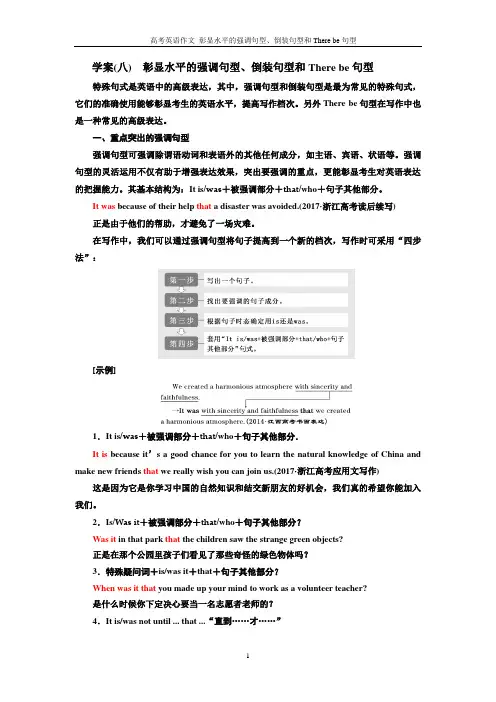
学案(八)彰显水平的强调句型、倒装句型和There be句型特殊句式是英语中的高级表达,其中,强调句型和倒装句型是最为常见的特殊句式,它们的准确使用能够彰显考生的英语水平,提高写作档次。
另外There be句型在写作中也是一种常见的高级表达。
一、重点突出的强调句型强调句型可强调除谓语动词和表语外的其他任何成分,如主语、宾语、状语等。
强调句型的灵活运用不仅有助于增强表达效果,突出要强调的重点,更能彰显考生对英语表达的把握能力。
其基本结构为:It is/was+被强调部分+that/who+句子其他部分。
It was because of their help that a disaster was avoided.(2017·浙江高考读后续写)正是由于他们的帮助,才避免了一场灾难。
在写作中,我们可以通过强调句型将句子提高到一个新的档次,写作时可采用“四步法”:[示例]1.It is/was+被强调部分+that/who+句子其他部分.It is because it’s a good chance for you to learn the natural knowledge of China and make new friends that we really wish you can join us.(2017·浙江高考应用文写作) 这是因为它是你学习中国的自然知识和结交新朋友的好机会,我们真的希望你能加入我们。
2.Is/Was it+被强调部分+that/who+句子其他部分?Was it in that park that the children saw the strange green objects?正是在那个公园里孩子们看见了那些奇怪的绿色物体吗?3.特殊疑问词+is/was it+that+句子其他部分?When was it that you made up your mind to work as a volunteer teacher?是什么时候你下定决心要当一名志愿者老师的?4.It is/was not until ... that ...“直到……才……”It was not until he went through real hardship that he realized the love we have for our families is important.直到他经历了真正的苦难,他才意识到我们对家人的爱很重要。
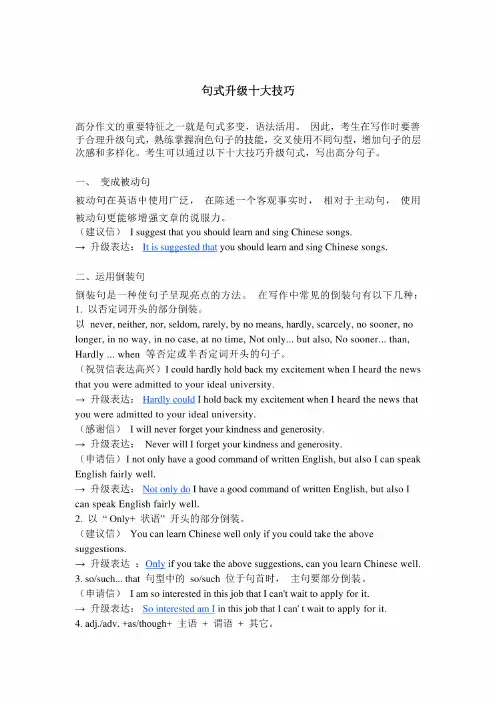
句式升级十大技巧高分作文的重要特征之一就是句式多变,语法活用。
因此,考生在写作时要善于合理升级句式,熟练掌握润色句子的技能,交叉使用不同句型,增加句子的层次感和多样化。
考生可以通过以下十大技巧升级句式,写出高分句子。
一、变成被动句被动句在英语中使用广泛,在陈述一个客观事实时,相对于主动句,使用被动句更能够增强文章的说服力。
(建议信)I suggest that you should learn and sing Chinese songs.一升级表达:It is suggested that you should learn and sing Chinese songs.二、运用倒装句倒装句是一种使句子呈现亮点的方法。
在写作中常见的倒装句有以下几种:1.以否定词开头的部分倒装。
以never,neither,nor,seldom,rarely,by no means,hardly,scarcely,no sooner,no longer,in no way,in no case,at no time,Not only...but also,No sooner...than, Hardly...when等否定或半否定词开头的句子。
(祝贺信表达高兴)I could hardly hold back my excitement when I heard the news that you were admitted to your ideal university.—>升级表达:Hardly could I hold back my excitement when I heard the news that you were admitted to your ideal university.(感询寸信)I will never forget your kindness and generosity.—>升级表达:Never will I forget your kindness and generosity.(申请信)I not only have a good command of written English,but also I can speak English fairly well.一升级表达:Not only do I have a good command of written English,but also I can speak English fairly well.2.以“Only+状语”开头的部分倒装。
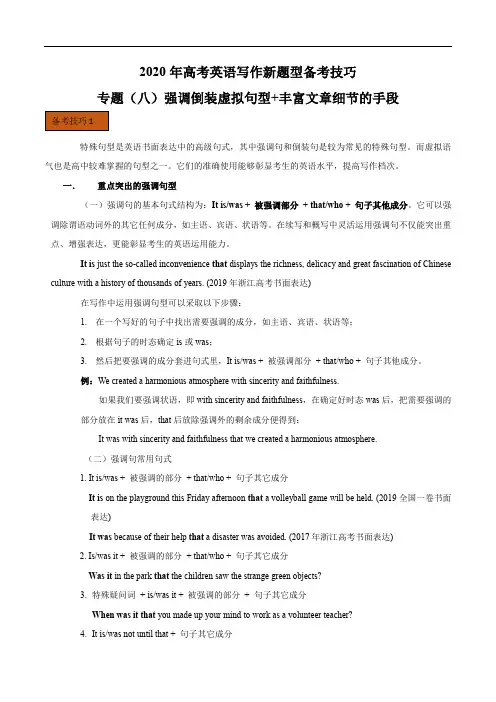
2020年高考英语写作新题型备考技巧专题(八)强调倒装虚拟句型+丰富文章细节的手段特殊句型是英语书面表达中的高级句式,其中强调句和倒装句是较为常见的特殊句型。
而虚拟语气也是高中较难掌握的句型之一。
它们的准确使用能够彰显考生的英语水平,提高写作档次。
一.重点突出的强调句型(一)强调句的基本句式结构为:It is/was + 被强调部分+ that/who + 句子其他成分。
它可以强调除谓语动词外的其它任何成分,如主语、宾语、状语等。
在续写和概写中灵活运用强调句不仅能突出重点、增强表达,更能彰显考生的英语运用能力。
It is just the so-called inconvenience that displays the richness, delicacy and great fascination of Chinese culture with a history of thousands of years. (2019年浙江高考书面表达)在写作中运用强调句型可以采取以下步骤:1.在一个写好的句子中找出需要强调的成分,如主语、宾语、状语等;2.根据句子的时态确定is或was;3.然后把要强调的成分套进句式里,It is/was + 被强调部分+ that/who + 句子其他成分。
例:We created a harmonious atmosphere with sincerity and faithfulness.如果我们要强调状语,即with sincerity and faithfulness,在确定好时态was后,把需要强调的部分放在it was后,that后放除强调外的剩余成分便得到:It was with sincerity and faithfulness that we created a harmonious atmosphere.(二)强调句常用句式1. It is/was + 被强调的部分+ that/who + 句子其它成分It is on the playground this Friday afternoon that a volleyball game will be held. (2019全国一卷书面表达)It was because of their help that a disaster was avoided. (2017年浙江高考书面表达)2. Is/was it + 被强调的部分+ that/who + 句子其它成分Was it in the park that the children saw the strange green objects?3.特殊疑问词+ is/was it + 被强调的部分+ 句子其它成分When was it that you made up your mind to work as a volunteer teacher?4.It is/was not until that + 句子其它成分It wasn’t until he went through real hardship that he realized the love for a family counts.5.注意:强调谓语动词时,可以用助动词do/does/didWe did hope there would be more meaningful activities in the coming future. (2015年北京高考) 二.平衡句子的倒装句型英语书面表达中的倒装举行主要包括部分倒装和全倒装。
2019-2020年高考英语虚拟语气和倒装句型虚拟语气是通过特殊的谓语动词形式来表达的愿望、假设、怀疑、猜测或建议等语气,它不表示客观存在。
一、虚拟语气在单句中的用法常用来表示祝愿、采用固定的倒装句式。
例如:Long live the People s Republic of China!中华人民共和国万岁!be happy! 快乐!have a good time! 玩得愉快! succeed! 成功!make progress! 进步!二、虚拟语气在复合句中的用法:1.在非真实性条件句与主句中的用法 1) 表示与现在事实相反条件从句 主句一般过去时(be 多用于were ) would/should/could/might +动词原形例如:If I were you,I should accept the invitation.如果我是你,我会接受邀请的。
如果我有空,我就去那儿。
2) 与过去事实相反May 祝条件从句主句过去完成时would/should/could/might+havedone例如:If you had e earlier,you couldn t/wouldn t have missed the bus.如果你早点来,你就不会错过那辆公共汽车了。
If he had seen you yesterday,he would have returned your book.如果他昨天见到了你,他就会还你的书的。
3)与将来事实可能相反条件从句主句一般过去时(be多用were)should do,were to do would/should/could/might+动词原形例如:If it should rain/were to rain/rained tomorrow,the sports meet would beput off.万一明天下雨,运动会就推迟。
(事实上明天下雨的可能性不大。
解密12特殊句式(强调,倒装,祈使句,感叹句等)考点详解【考点解读】1. 掌握倒装的必备条件及倒装的具体应用。
2. 熟知强调句的基本结构及其疑问句句式、特殊疑问句式,注意其与结构相似的主从复合句的区别。
3. 掌握省略的一些基本原则,在行文中正确地使用省略。
4. 掌握祈使句、感叹句的基本形式及用法。
5. 掌握反意疑问句的构成和用法。
【命题趋势】近两年高考试卷中的语篇型语法填空题对特殊句式的考查很少,但强调句型、倒装句、there be 句型等均为高中教学的重点内容,所以在高考备考中,考生仍然需要掌握这部分内容,以便有充分的知识储备和较强的综合能力应对高考。
考向1 倒装倒装是英语中常见的一种语言现象,它具有强调、修饰等作用。
倒装可分为完全倒装和部分倒装。
一、完全倒装完全倒装是指将句子中的谓语动词全部置于主语之前。
此结构通常只用于一般现在时或一般过去时。
常见的结构有:1. There be句型:其中be可换成live, lie, stand, remain, exist, come, go, seem (appear/ happen/ used) to be等表示"存在"意义的词。
☛There entered a strange little man. 走进来一个奇怪而身材矮小的人。
☛Once there lived an old fisherman in a village by the sea. 从前,海边的一个村子里住着一位老渔夫。
2. 以here, there, off, out, in, up, down, away, now, then, on等表示方向、位置或时间、地点的副词开头的句子,谓语是come, go, be等动词时,并且其主语为名词时,通常使用完全倒装。
☛Now, here goes the story. 现在,这个故事是这样的。
☛Then came another question. 然后又一个问题被提出来了。
五、虚拟语气虚拟语气用来表示说话人的主观愿望或假想,而不表示客观存在的事实,所说的是一个条件,不一定是事实,或与事实相反。
虚拟语气通过谓语动词的特殊形式来表示。
一、条件句中的虚拟语气从句中提出一种与客观现实不相符或根本不可能存在的条件,主句会产生的一种不可能获得的结果。
1. 条件句中的虚拟语气根据不同的时间有三种不同的形式。
时间从句谓语形式主句谓语形式将来①过去式/ were(常用)②were to do(可能性小)③should + V. (原)(可能性大)would / should / might / could + V. (原)现在过去式(be 用 were) would / should / might / could + V. (原)过去had done would / should / might / could + have done(1)与将来事实相反:e.g. If it rained/were to rain/should rain tomorrow, I should stay at home.(2)与现在事实相反:e.g. If he were free, he would help us.(3)与过去事实相反:e.g. If I had seen the film, I would have told you about it.2. 条件句中的省略与倒装当虚拟条件句的谓语动词含有were, should, had 时,if可省略,而将were, should, had等词置于句首。
e.g. Were it not for your help, I wouldn't be doing so well.若不是你帮忙,我现在不会干得这样好。
Had I been there, I would have asked her the question.如果我在那里,我就会问她这个问题。
高考英语作文彰显水平的强调句型、倒装句型和There be句型family.直到他经历了真正的困难,他才意识到我们对家庭的爱。
二、倒装句型倒装句型是指将谓语动词或助动词提到主语之前的句子结构。
在英语中,倒装句型有多种形式,如全部倒装、部分倒装和虚拟语气中的倒装等。
倒装句型的使用能够让句子更加生动有力,提高表达效果。
1.全部倒装全部倒装的结构为:助动词/情态动词/系动词+主语+谓语动词+其他。
Never XXX I XXX.我从未见过如此美丽的日落。
2.部分倒装部分倒装是指将助动词或情态动词提到主语之前的句子结构。
常见的结构有:否定词/副词+助动词/情态动词+主语+谓语动词+其他;表示地点、方向、方式等的状语放在句首,谓语动词和主语倒装。
XXX。
but she also helped her classmates.她不仅完成了自己的作业,还帮助了同学们。
Up came the sun。
and the fog disappeared.太阳升起来了,雾气消失了。
3.虚拟语气中的倒装虚拟语气中的倒装是指在虚拟语气中,将情态动词或助动词提到主语之前的句子结构。
常见的结构有:should/ were/ had/ were it not for等+主语+谓语动词+其他。
Had itnot been for his timely help。
we would have failed.如果不是他及时的帮助,我们就会失败。
三、There be句型There be句型是指以there be开头的句子结构,其中be动词后面跟着一个名词或名词短语,表示某处存在某物或某事。
There be句型在句子中常用于描述场景、环境、情况等,使用灵活能够使句子更加生动有力。
There is a beautiful XXX.我家后面有一个美丽的花园。
在使用There be句型时,要注意名词前面要加上冠词或其他限定词,如a/an。
the。
some。
2020届全国新高考英语核心考点考点09情态动词和虚拟语气2020届全国高考英语复习备考建议(一).以词汇为抓手,培养词汇的活用能力。
3500词汇常抓不懈,时刻贯穿课堂,以讲练结合的形式逐一过关。
指导学生科学地记忆单词依然是二轮复习的重点。
过好词汇关才会有挑战高分的资本。
(二).以阅读和写作为重点,搞好专题突破,提升能力。
1. 阅读是考查学生语言运用能力的主要形式,体裁多样,内容广泛。
因此,应选择不同体裁如记叙文、说明文、议论文、应用文以及不同题材如科普知识、人物传记、历史文化、新闻报道等时效性较强而且学生感兴趣、难易度与高考相近的文章,让学生限时阅读。
因为学生在限时阅读时,精力集中,思维积极,理解效果好,可以提高阅读速度。
(阅读理解四篇,30分钟,目的是提高阅读速度,培养良好的阅读习惯。
然后,马上讲评,可以让学生讲,老师补充。
)阅读中要克服心理障碍,其表现为长句障碍、词汇障碍、文化障碍以及话题体裁障碍(有同学一看到科普类、社会文化类的文章,头就昏了,马上产生畏惧心理),这就要求老师对学生心理指导,并帮助他们提高长难句的分析能力以及答题技巧,往往文章难的,设题简单,并告诉他们如何从文章中找到答案,陌生词不是那么可怕。
2.写作:2019年普通高等学校招生全国统一考试大纲要求考生根据提示进行书面表达。
书面表达能力的提高一方面需要大量阅读,另一方面离不开反复地进行语言基本功的训练。
而英语写作能力的培养必须由简到繁,由易到难,由浅入深,循序渐进地进行训练。
平时强化词汇、语法知识的运用,背诵一定篇数的经典范文,并在此基础上多读、多写,养成良好的写作习惯。
考生应该加强审题的训练,熟悉英语的五种简单基本句型,写好英语简单句。
背课文和范文佳作,并且模仿其中的高级表达,学会使用这些高级表达来润色自己的文章。
熟悉和了解高考书面表达的评分标准以及得分档次。
加强书写的工整和美观。
(三)、听力训练要常抓不解,久久为功。
除了每天坚持听一套听力材料外,还应在课堂上对学生听力技巧的训练。
高考作文的句式变化高考作文是考生面对的一项重要任务,准备充分并熟悉不同句式的应用是取得优异成绩的关键。
在作文中灵活运用句式变化可以提高文章的表达能力和语言的多样性。
本文将介绍一些常用的句式变化方法,帮助考生提升作文水平。
一、主谓结构变化1. 倒装句:在句子中,把主语和谓语的位置颠倒,以突出某种特殊的说法效果。
例:On the desk lies a book.(书在桌子上。
)2. 强调句:通过使用强调句,凸显句子中某一部分的重要性。
例:It was John who won the first prize.(是约翰获得了一等奖。
)3. 分词结构:使用动词-ing或-ed的现在分词或过去分词作状语,来替代传统的主谓结构。
例:Looking out of the window, I saw a beautiful sunset.(透过窗户向外看,我看到了美丽的日落。
)二、并列结构变化1. 连词变化:替换原有的连词,使句子意义得到丰富。
例:I want to be a doctor, or at least something related to medical science.(我想成为一名医生,或者至少从事与医学相关的工作。
)2. 使用副词修饰词组:在句子中使用副词来增加对词组的修饰,使表达更加准确。
例:She sang with passion and grace.(她以激情和优雅的方式唱歌。
)三、借助插入语变化1. 插入过去式短语:在句子中插入一个过去式短语,以提供过去的背景信息。
例:The student, filled with excitement, rushed into the classroom.(充满兴奋的学生跑进教室。
)2. 插入非限制性定语从句:在句子中插入一个非限制性定语从句,对主句进行进一步解释和补充。
例:Tom, who is my best friend, always helps me when I'm in trouble.(汤姆,我最好的朋友,在我有困难时总是帮助我。
2020年高考英语写作新题型备考技巧专题(八)强调倒装虚拟句型+丰富文章细节的手段特殊句型是英语书面表达中的高级句式,其中强调句和倒装句是较为常见的特殊句型。
而虚拟语气也是高中较难掌握的句型之一。
它们的准确使用能够彰显考生的英语水平,提高写作档次。
一.重点突出的强调句型(一)强调句的基本句式结构为:It is/was + 被强调部分+ that/who + 句子其他成分。
它可以强调除谓语动词外的其它任何成分,如主语、宾语、状语等。
在续写和概写中灵活运用强调句不仅能突出重点、增强表达,更能彰显考生的英语运用能力。
It is just the so-called inconvenience that displays the richness, delicacy and great fascination of Chinese culture with a history of thousands of years. (2019年浙江高考书面表达)在写作中运用强调句型可以采取以下步骤:1.在一个写好的句子中找出需要强调的成分,如主语、宾语、状语等;2.根据句子的时态确定is或was;3.然后把要强调的成分套进句式里,It is/was + 被强调部分+ that/who + 句子其他成分。
例:We created a harmonious atmosphere with sincerity and faithfulness.如果我们要强调状语,即with sincerity and faithfulness,在确定好时态was后,把需要强调的部分放在it was后,that后放除强调外的剩余成分便得到:It was with sincerity and faithfulness that we created a harmonious atmosphere.(二)强调句常用句式1. It is/was + 被强调的部分+ that/who + 句子其它成分It is on the playground this Friday afternoon that a volleyball game will be held. (2019全国一卷书面表达)It was because of their help that a disaster was avoided. (2017年浙江高考书面表达)2. Is/was it + 被强调的部分+ that/who + 句子其它成分Was it in the park that the children saw the strange green objects?3.特殊疑问词+ is/was it + 被强调的部分+ 句子其它成分When was it that you made up your mind to work as a volunteer teacher?4.It is/was not until that + 句子其它成分It wasn’t until he went through real hardship that he realized the love for a family counts.5.注意:强调谓语动词时,可以用助动词do/does/didWe did hope there would be more meaningful activities in the coming future. (2015年北京高考)二.平衡句子的倒装句型英语书面表达中的倒装举行主要包括部分倒装和全倒装。
一般应用文、议论文、故事续写和文章概写都可使用倒装句型,可以使句子更为生动和高级。
考生平时应多注意和练习以下句型。
1.“only + 状语”置于句首时,句子需要使用部分倒装。
We can help to construct an energy-saving society only with joint efforts.Only with joint efforts can we help to construct an energy-saving society.2.none, neither, nor, never, hardly, scarcely, barely, little, seldom等否定词或at no time, in no way,under no circumstances, by no means, not until, not only, not a single word等表示否定意义的短语放于句首时,句子也要部分倒装。
①. He not only made a promise, but also he kept it.Not only did he make a promise, but also he kept it.②. We had no sooner arrived at the activity center than we signed up for the Walking Contest.No sooner had we arrived at the activity center than we signed up for the Walking Contest.3.在so/such…that…结构中,当so/such…位于句首时,后面的从句需要考虑使用倒装。
①. We are so eager to win the game that we should prepare for it.So eager to win the game are we that we should prepare for it. (2019全国一卷书面表达)②. He drove so carelessly that he almost killed himself.So carelessly did he drive so carelessly that he almost killed himself.4.as表示尽管时,后面的形容词、名词、副词等成分必须置前;though在这种情况下,是否倒装都可以。
Though/Although/While he was, he still went on with his farm work.Exhausted as/though he was, he still went on with his farm work.5.虚拟语气条件句中的“Were/Should/Had I…”倒装句式①. Looking back, I feel I wouldn’t be able to ride a bike if I had lost heart.Looking back, I feel I wouldn’t be able to ride a bike had I lost heart.②. If I were two years younger, I would do something.Were I two years younger, I would do something.6.以副词there, here, away, down, off, in, out等副词或者in the room, on the wall等介词短语为首时,后面的主语为名词时,需要用全倒装;主语若为人称代词,则不用倒装。
①. Here are some relevant details about it. (2018年全国二卷书面表达)②.The door opened and in came Mr. Wang.③. In front of the school stands the hospital.三.委婉动听的虚拟语气在书面表达中,运用高阶语法虚拟语气需要注意表达的准确性。
如果表达不太真实的条件或者表达要求、愿望、强调论述观点的客观性时,考生可以借助虚拟语气,使书面表达更为精彩。
陈述语气变虚拟语气:①. I didn’t take his advice, so I failed in the exam.If I had taken his advice, I wouldn’t have failed in the exam.②. It’s time for us to take measures to protect endangered animals.It’s time that we took measures to protect endangered animals.写作中常见的虚拟语气句式:1.If 虚拟语气,与过去、现在、将来相反If I were you, I would take a walk in the evening with my friends. (2014安徽高考书面表达)2.…wish…would/had done/were/did… 希望/但愿……I wish there wouldn’t be too many students in a class.3.…as if/as though…与过去现在相反,表示“好像”Everything in my childhood crowded upon my mind as if they had just happened.4.If only I could/did/had done…我要是……就好了If only I could go back and reset my goals. (2015重庆高考书面表达)5.It’s (high/about) time (that)…did/should do…是时候……It’s high time that both children and parents took action to make some changes.6.should have done本应该做;shouldn’t have done 本不应该做I shouldn’t have left Tom. (2016浙江高考书面表达)7.suggest, propose, order, advise, insist, demand等宾语从句中的虚拟语气(should) do…To master Mandarin, I strongly suggest you practice with Chinese people. (2015四川高考书面表达)8.without/but for/but that…含蓄型虚拟语气,表“要不是……”Without your help, we couldn’t have finished the work ahead of time.提升训练一.句子综合训练。